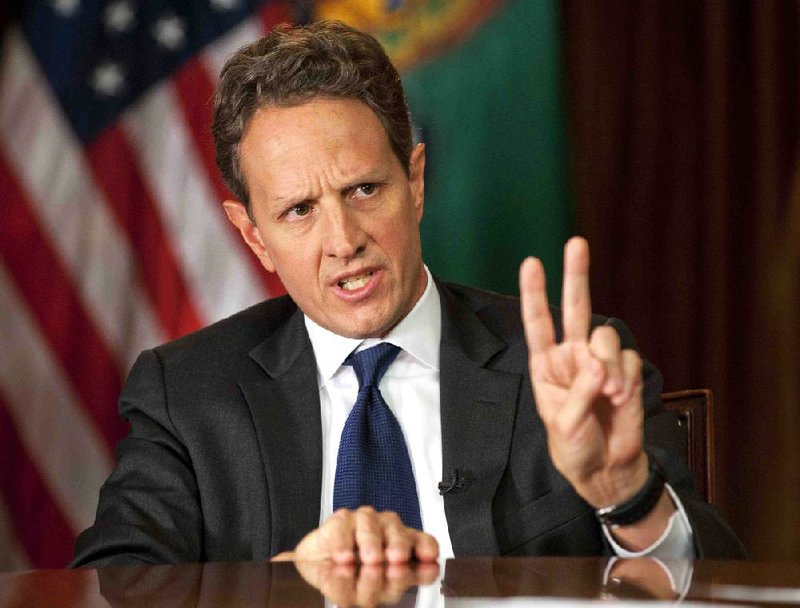WASHINGTON — Republicans have to stop using “political math” and say how much they are willing to raise tax rates on the wealthiest 2 percent of Americans and then specify the spending cuts they want, Treasury Secretary Timothy Geithner said in an interview that aired Sunday.
Just four weeks from the “fiscal cliff,” House Speaker John Boehner countered that Republicans have a plan for providing as much as $800 billion in new government revenue over the next decade and would consider the elimination of tax deductions on high-income earners. But when pressed on Fox News Sunday for precise details, the Ohio Republican declined to say.
There are “a lot of options in terms of how to get there,” Boehner said.
Both Boehner’s and Geithner’s latest remarks indicate it could be some time before serious negotiations begin between the White House and Republicans on how to avert economic calamity expected in less than a month when President George W. Bush-era tax cuts expire and automatic, across-the-board spending cuts kick in.
Together, the automatic spending cuts and tax increases would cut the deficit for fiscal 2013 by more than $500 billion, an amount so sudden and large that economists say it would cause a recession.
Last week, the White House delivered to Capitol Hill its opening plan: $1.6 trillion in higher taxes over a decade, hundreds of billions of dollars in new spending, a possible extension of the temporary Social Security payroll-tax cut and enhancing the president’s power to raise the national debt limit.
In exchange, the president would back $600 billion in spending cuts, including $350 billion from Medicare and other health programs. But he also wants $200 billion in new spending for jobless benefits, public-works projects and aid for struggling homeowners.
Republicans said they responded in private meetings with laughter and disbelief.
“I was just flabbergasted,” Boehner said. “I looked at him [Geithner] and I said, ‘You can’t be serious.’” Boehner described negotiations as going “nowhere, period,” and said “there’s clearly a chance” the nation will go over the cliff.
“We’ve put a serious offer on the table by putting revenues out there to try to get this question resolved,” he said. “But the White House has responded with virtually nothing.”
Geithner, the administration’s point man for negotiations, was slightly more optimistic while saying the ball was in Boehner’s court. But the Treasury Department secretary also said he didn’t expect a counteroffer right away, as Republicans work to sort out tensions within the party in the wake of bruising national elections that left Democrats in charge of the White House and the Senate.
Boehner acknowledged in his interview, aired Sunday, that he wasn’t happy with public remarks by Republican Rep. Tom Cole of Oklahoma, who said he was ready to go along with Obama’s plan to renew expiring income tax cuts for the majority of Americans and negotiate the rates on top earners later.
“They’re trying to figure out where they go next,” Geithner said of Republicans, “and we might need to give them a little time to figure out where they go next.”
He called the back-and forth “normal political theater,” saying all that’s blocking a timely deal is the GOP’s reluctance to accept higher tax rates on high earners.
“It’s welcome that they’re recognizing that revenues are going to have to go up. But they haven’t told us anything about how far rates should go up ... [and] who should pay higher taxes,” Geithner said.
“There’s just no reason why 98 percent of Americans have to see their taxes go up because some members of Congress on the Republican side want to block tax-rate increases for 2 percent of the wealthiest Americans,” Geithner said. “Remember, those tax rates, those tax cuts, cost a trillion dollars over 10 years.”
House Minority Leader Nancy Pelosi, D-Calif., said Sunday that she will try to force a vote on the Senate-passed bill favored by Democrats to avert a fiscal cliff. But she was unlikely to line up enough Republicans to succeed.
Obama’s political team ramped up its efforts, blasting out an e-mail Sunday night urging supporters to pressure Congress to extend tax cuts that would add up to about $2,000 for a middle-class family of four.
Republican leaders have said they accept higher tax revenue overall, but only through what they call tax reform - ending some tax breaks and limiting deductions - and only coupled with tough measures to curb the explosive growth of Medicare, Medicaid and Social Security.
“If we gave the president $1.6 trillion of new money, what do you think he’d do with it?” asked Boehner. “He’s going to spend it. It’s what Washington does.”
Generally Republicans, much like Mitt Romney in his presidential campaign, have proposed without specifics that additional revenue could be raised over 10 years by limiting tax deductions for high-income earners, rather than raising their rates. But the White House and nonpartisan policy organizations have done analyses showing that revenue cannot be raised on that scale without ending popular deductions for mortgage interest, charitable contributions and state and local taxes, even for some middle income taxpayers.
Cole didn’t back down Sunday on his earlier comments that Republicans should agree to Obama’s plan for continuing Bush’s tax rates for middle class America and focus the negotiations on the other issues. Doing so, he said, would make the GOP position even stronger.
“The reality is, nobody can look at this budget and think if you don’t reform entitlements you can balance it. You can give the president every tax increase he’s asked for, you’d still be in the hole,” he said.
Information for this article was contributed by Anne Flaherty, Mark S. Smith and Erik Schelzig of The Associated Press; and by Jackie Calmes of The New York Times.
Front Section, Pages 1 on 12/03/2012

